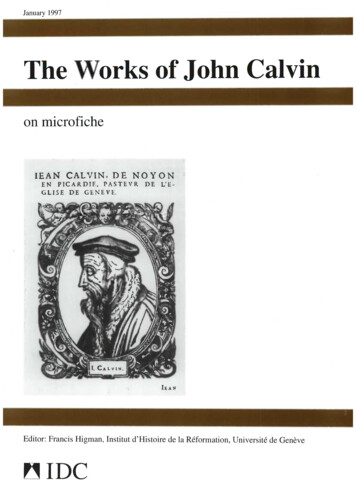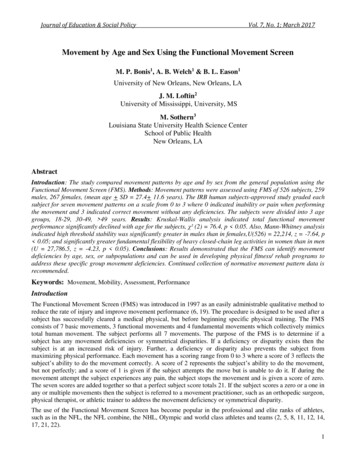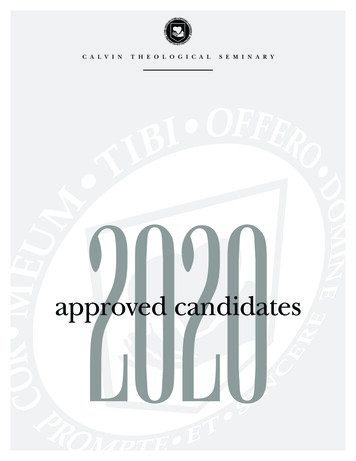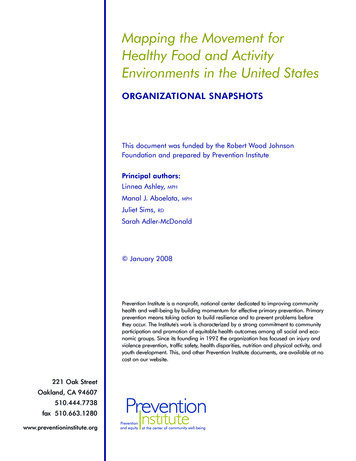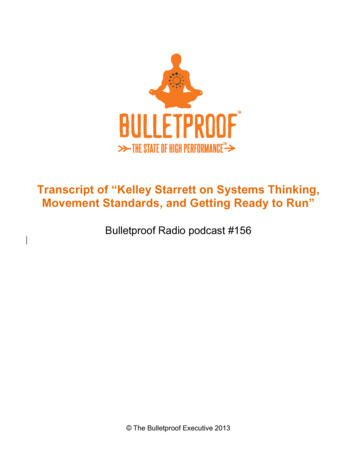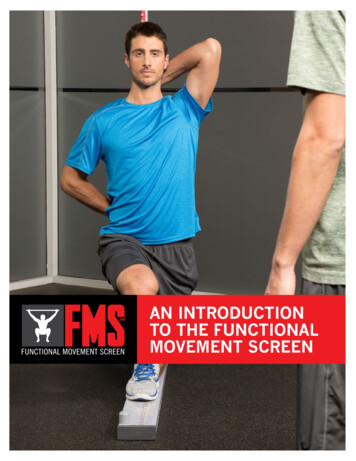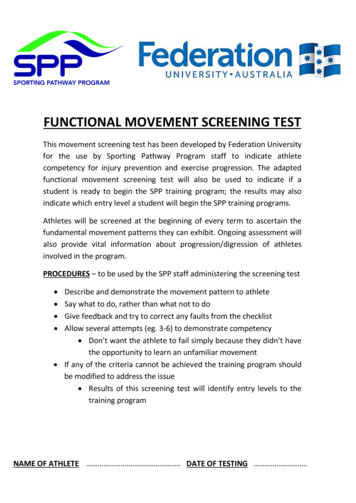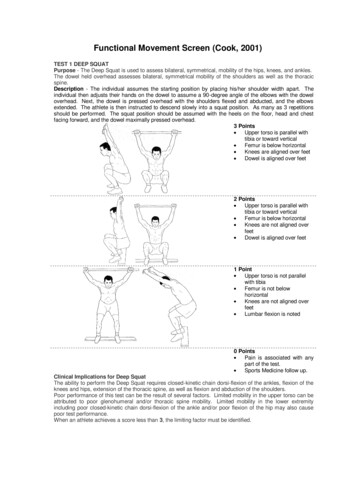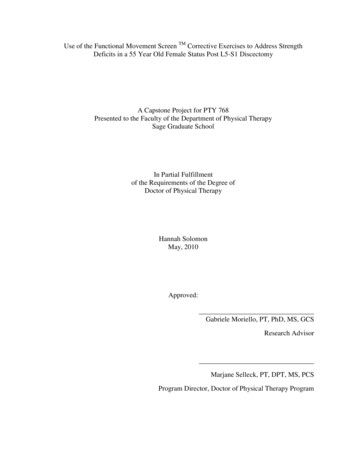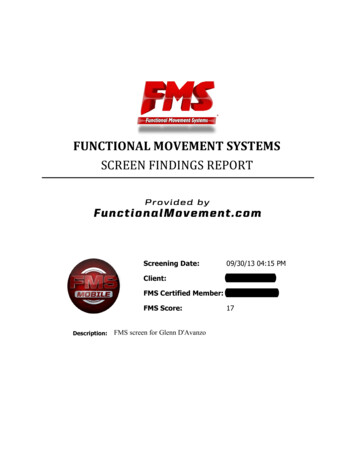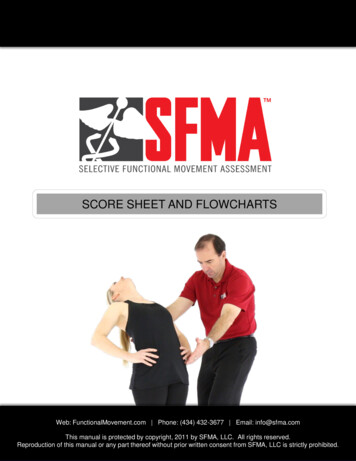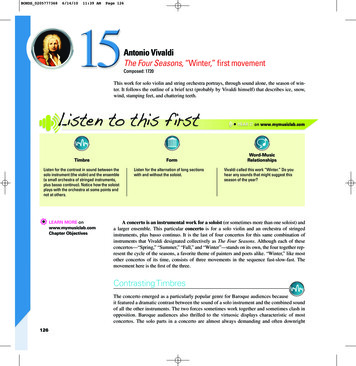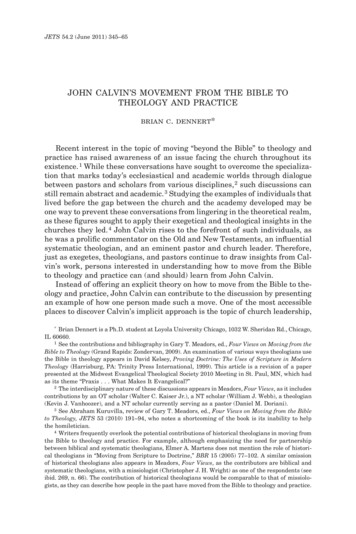
Transcription
JETS 54.2 (June 2011) 345–65JOHN CALVIN’S MOVEMENT FROM THE BIBLE TOTHEOLOGY AND PRACTICEbrian c. dennert*Recent interest in the topic of moving “beyond the Bible” to theology andpractice has raised awareness of an issue facing the church throughout itsexistence. 1 While these conversations have sought to overcome the specialization that marks today’s ecclesiastical and academic worlds through dialoguebetween pastors and scholars from various disciplines, 2 such discussions canstill remain abstract and academic. 3 Studying the examples of individuals thatlived before the gap between the church and the academy developed may beone way to prevent these conversations from lingering in the theoretical realm,as these figures sought to apply their exegetical and theological insights in thechurches they led. 4 John Calvin rises to the forefront of such individuals, ashe was a prolific commentator on the Old and New Testaments, an influentialsystematic theologian, and an eminent pastor and church leader. Therefore,just as exegetes, theologians, and pastors continue to draw insights from Calvin’s work, persons interested in understanding how to move from the Bibleto theology and practice can (and should) learn from John Calvin.Instead of offering an explicit theory on how to move from the Bible to theology and practice, John Calvin can contribute to the discussion by presentingan example of how one person made such a move. One of the most accessibleplaces to discover Calvin’s implicit approach is the topic of church leadership,* Brian Dennert is a Ph.D. student at Loyola University Chicago, 1032 W. Sheridan Rd., Chicago,IL 60660.1 See the contributions and bibliography in Gary T. Meadors, ed., Four Views on Moving from theBible to Theology (Grand Rapids: Zondervan, 2009). An examination of various ways theologians usethe Bible in theology appears in David Kelsey, Proving Doctrine: The Uses of Scripture in ModernTheology (Harrisburg, PA: Trinity Press International, 1999). This article is a revision of a paperpresented at the Midwest Evangelical Theological Society 2010 Meeting in St. Paul, MN, which hadas its theme “Praxis . . . What Makes It Evangelical?”2 The interdisciplinary nature of these discussions appears in Meadors, Four Views, as it includescontributions by an OT scholar (Walter C. Kaiser Jr.), a NT scholar (William J. Webb), a theologian(Kevin J. Vanhoozer), and a NT scholar currently serving as a pastor (Daniel M. Doriani).3 See Abraham Kuruvilla, review of Gary T. Meadors, ed., Four Views on Moving from the Bibleto Theology, JETS 53 (2010) 191–94, who notes a shortcoming of the book is its inability to helpthe homiletician.4 Writers frequently overlook the potential contributions of historical theologians in moving fromthe Bible to theology and practice. For example, although emphasizing the need for partnershipbetween biblical and systematic theologians, Elmer A. Martens does not mention the role of historical theologians in “Moving from Scripture to Doctrine,” BBR 15 (2005) 77–102. A similar omissionof historical theologians also appears in Meadors, Four Views, as the contributors are biblical andsystematic theologians, with a missiologist (Christopher J. H. Wright) as one of the respondents (seeibid. 269, n. 66). The contribution of historical theologians would be comparable to that of missiologists, as they can describe how people in the past have moved from the Bible to theology and practice.
346journal of the evangelical theological societyparticularly church government, as one can see how he developed his insightsfrom Scripture into a theological vision and attempted to bring this vision intoreal-life practice in the Genevan church. 5 In addition to being readily accessible in Calvin’s work, the topic of church government also serves as a placewhere the different meanings of “going beyond the Bible” may fuse, as it hasboth theological/doctrinal and ethical/practical elements. 6Therefore, the aim of this study is to understand how Calvin moved fromthe Bible to practice, not to evaluate Calvin’s biblical interpretation and theological beliefs concerning church government. After examining Calvin’s theology of church government and how he sought to appropriate these ideas inhis reformation of the Genevan church, 7 the paper will then discuss Calvin’smovement from Scripture to theology and practice in comparison to contemporary models. 8i. from scripture to theologySome have argued that Calvin’s views on church leadership originatedfrom his experience in Strasbourg rather than from biblical exegesis. 9 Likeall his views in theology, Calvin’s positions on church order certainly grewover time, 10 and the exegetical history preceding him and his contemporary5 While Calvin’s sermons are the place where he sought to apply the meaning of the text to thelives of ordinary Christians (see Randall C. Zachman, “Expounding Scripture and Applying It toOur Use: Calvin’s Sermons on Ephesians,” SJT 56 [2003] 481–507, esp. 503–7), the nature of churchgovernment makes the practice in Geneva rather than Calvin’s comments on the topic in sermonsthe best place to detect how he applied his theological ideas.6 On the various ways of “moving beyond the Bible,” see the reflections by Mark L. Straussand Al Wolters in Meadors, Four Views 272, 300. In addition, this issue will integrate the conceptsof direct teaching, implied teaching, and creative constructs discussed in Meadors’ introductoryremarks (ibid. 10–11).7 All citations from the Institutes are from John Calvin, Institutes of the Christian Religion(ed. John T. McNeill; trans. Ford Lewis Battles; 2 vols.; LCC 20–21; Philadelphia: Westminster,1960). All references to Calvin’s commentaries are from John Calvin, Calvin’s Commentaries (45vols.; Edinburgh: Calvin Translation Society, 1844–56; repr. 22 vols.; Grand Rapids: Baker, 1981).8 By using Calvin’s practice rather than his explicit views on developing theology from the Bible,the approach of the present study loosely imitates the case study method used in Kelsey, ProvingDoctrine xii, 4, 14–119. It goes further than Kelsey’s examination, however, in noting both the useof the Bible in doctrinal formulations and the application of doctrine to the life of the church.9 Scholars have leveled this accusation in regards to the elders and the deacons of Calvin’ssystem, as discussed, respectively, in Ronald S. Wallace, Calvin, Geneva, and the Reformation (GrandRapids: Baker, 1988) 141; and Elsie McKee, John Calvin on the Diaconate and Liturgical Almsgiving(Geneva: Librarie Droz, 1984) 137. On the influence of Strasbourg on the Genevan Academy andoffice of teacher, see Robert W. Henderson, The Teaching Office in the Reformed Tradition (Philadelphia: Westminster, 1962) 36–41. Another hypothesis is that Calvin’s view of church leadershipderived from the seniores laici of the early church in North Africa (Thomas F. Torrance, “The Eldership in the Reformed Church,” SJT 37 [1984] 503–5).10 “Calvin’s theology must be understood not as a finished product but as a theology in development—specifically, a theology that was learned in the course of a life of exegetical, homelitical,and ecclesial labor in close dialogue, positive and negative, with a definable group of partners inconversation” (Richard Muller, The Unaccommodated Calvin: Studies in the Foundation of a Theological Tradition [New York: Oxford University Press, 2000]) 187. On the development of Calvin’sthought as displayed in the successive editions of the Institutes, see Francois Wendel, Calvin: Originsand Development of His Religious Thought (trans. Philip Mairet; New York: Harper & Row, 1963)112–355; Muller, Unaccommodated Calvin 118–39. Calvin’s commentaries also display expansion
calvin’s movement from the bible to theology and practice 347historical setting affected how he interpreted the texts and how he expressedhis views, as they do for every individual. 11 It is also true that Calvin onlyarticulated his views on church government after his experience in Strasbourg,where Martin Bucer had already established the four offices Calvin woulddescribe and introduce in Geneva. 12 It appears, however, that Calvin had atleast some perspectives on church government before his exile to Strasbourgbecause of his discussion of the deacon in the 1536 edition of the Institutes, 13the mention of a group to oversee the morals of the church in the 1537 ArticlesConcerning the Organization of the Church and of Worship at Geneva Proposedby the Ministers at the Council, 14 and the reforms Calvin made to the schoolsystem before his expulsion from Geneva in 1538. 15 While showing the influence of Martin Bucer, Calvin’s use of the same biblical passages as Bucer inhis discussion of these offices reveals a concern in Calvin that the Bible, nottradition, establish the offices, 16 supporting Calvin’s claim to use traditionwhen it conforms with Scripture. 17 Furthermore, Calvin viewed himself as “aservant of the word of God in the Genevan church,” whose task was to proclaimand interpret Scripture accurately to the people so that it might be useful tothe church. 18 Therefore, while many factors influenced Calvin’s views, he sawhis task as moving from the Bible to theology and practice, attempting to bringthe truth of Scripture into contemporary practice. 19and development, as discussed in R. Ward Holder, “Calvin and Tradition: Tracing Expansion, Locating Development, Suggesting Authority,” TJT 25 (2009) 215–25.11 On historical and contemporary influences on Calvin’s work, see Wendel, Calvin: Origins andDevelopment 122–44; David C. Steinmetz, Calvin in Context (New York: Oxford University Press,1995); Muller, Unaccomodated Calvin. Detailed examinations of Calvin’s exposition of passages ondeacons and elders in light of their exegetical history appear in McKee, John Calvin on the Diaconate;idem, Elders and the Plural Ministry: The Role of Exegetical History in Illuminating John Calvin’sTheology (Geneva: Librairie Droz, 1988).12 The chapters dealing with the organization and officers of the church first appeared in the1543 edition of the Institutes, although Calvin had already described the four offices in the 1541Ecclesiastical Ordinances, noting that they derive from the will of God.13 Jeannine E. Olson, “Calvin as Pastor-Administrator During the Reformation in Geneva,”Pacific Theological Review 14 (1981) 12–13.14 For text of the Articles, see J. K. S. Reid, ed., Calvin: Theological Treatises (LCC 22; Philadelphia: Westminster, 1954) 48–55. While the 1537 Articles only mention the office of pastor, figuresthat functioned like the elders that later developed in Geneva also appear (see ibid. 53–54).15 See W. Stanford Reid, “Calvin and the Founding of the Academy of Geneva,” WTJ 18 (1955)7–8; Henderson, Teaching Office 43–49. Cf. Reid, Calvin: Theological Treatises 54.16 Wendel, Calvin: Origins and Development 76. For an analysis of the role of biblical exegesisin the views of Calvin and Bucer, see Robert E. Uprichard, “The Eldership in Martin Bucer andJohn Calvin,” EvQ 61 (1989) 21–37.17 On the various ways that Calvin uses the Fathers, ranging from refuting them to using theirauthority to help establish his point, see Holder, “Calvin and Tradition” 215–25. Using StephenToulmin’s analysis of an argument (as summarized in Kelsey, Proving Doctrine 125–31), one wouldthus see tradition as warrants, qualifiers, rebuttals, and backings for his claims.18 Wulfert de Greef, “Calvin’s Understanding and Interpretation of the Bible,” in John Calvin’sImpact on Church and Society, 1509–2009 (ed. Martin Hirzel and Martin Sallman; trans. DavidDichelle; Grand Rapids: Eerdmans, 2009) 67–68, 72–73 (quotation on p. 67). Calvin would viewevery minister as being a servant of the Word who was to expound it rather than create somethingnew; see Institutes 4.8.9.19 In Toulmin’s scheme (see n. 17), the Bible functions as the data for Calvin’s theological claims.See Institutes, 4.17.26: “the doctrine which we have put forward has been drawn from the pure Wordof God, and rests upon its authority.”
348journal of the evangelical theological societyCalvin deemed Scripture to prescribe an “order by which the Lord willedhis church to be governed,” 20 which is the “mode established by the Lordforever.” 21 However, this conviction did not cause Calvin to argue that onemust slavishly model today’s church after that of the NT, as he believed theNT neither is nor gives a church constitution. Instead, Scripture defines thebasic structure and principles needed for church government, with outwardcircumstances affecting what it would look like in practice. 22 The conditionsof the early church influenced its organization, meaning that some details ofits practice recorded in Scripture are not normative. For example, commentingon Acts 6, Calvin remarks, “The number of seven is applied unto the presentnecessity, lest any man should think that there is some mystery under thesame.” 23 Because of this, Calvin believed that churches have freedom in making their constitutions, as his comment on 1 Cor 11:2 makes clear: “For weknow that every Church has liberty to frame itself a form of government thatis suitable and profitable for it, because the Lord has not prescribed anythingdefinite.” 24 The church should thus frame a constitution that fits the “customs”of the “nation and age,” with it being advantageous at times for the churchto “change and abrogate traditional practices and to establish new ones.” 25While maintaining that a church has freedom to construct its own constitution, Calvin held that there are certain structures and principles thatmust be included in such governments in order for church leaders to derivetheir authority from God rather than human traditions. 26 Included amongthe principles is the need for a church constitution, as Calvin saw the command of 1 Cor 14:40 that all things be done decently and in order issuingan imperative for church constitutions since, in Calvin’s mind, the greatestdanger for doing things irregularly occurs in church government. 27 In fact,Calvin refers to 1 Cor 14:40 and its abiding significance immediately after hiscomment on 1 Cor 11:2 about the lack of definiteness in the prescriptions ofScriptures, showing the reality that some structures and principles must bepresent in the church within the liberty allowed in church constitutions. 28 Instructure, Calvin believed such a government must differ from Israel’s theocracy. 29 He also viewed it as different from the apostolic system in the NTbecause certain offices were temporary and designed for the establishment ofIbid 4.3.1; Commentaries on the Epistles of Paul to the Galatians and Ephesians 277, 281.Institutes 4.3.3.22 Wallace, Calvin 141–142; Carlos E. Wilton, “John Calvin’s Theology of Ordination,” PTR 6(1999) 8. See Institutes 4.10.30.23 Commentary upon the Acts of the Apostles (2 vols.) 1.235.24 Commentary on the Epistles of Paul the Apostle to the Corinthians (2 vols.) 1.350–53. Formore on this issue, see Benjamin Milner, Calvin’s Doctrine of the Church (Leiden: Brill, 1970) 173.25 Institutes 4.10.30.26 Ibid. 4.10.30–32; Corinthians 1.474.27 Institutes 4.3.1. Calvin calls 1 Cor 14:40 “a doctrine that is always in force, as to the purposeto which the polity of the Church ought to be directed” (Corinthians 1.474).28 Institutes 4.10.27, 28, 30. See Milner, Calvin’s Doctrine 134–35, 173–75; Wallace, Calvin 135.29 This is a key difference between the views of Zwingli and Calvin. For Calvin’s view on thejurisdiction of the church’s authority, see Institutes 4.11.1.2021
calvin’s movement from the bible to theology and practice 349the church. 30 According to Calvin, Scripture describes four permanent offices:pastor, teacher, governor, and deacon. 31 Discussion of each office in turn willshow Calvin’s rationale for seeing these four offices as perpetual institutionsof the church.Calvin found the biblical basis for the office of pastor in Eph 4:11, as Paulnotes that God gave pastors as gifts to the church, who are delegates to declarehis Word and nurture the church (2 Cor 5:21, 27; Eph 4:4–16). 32 Accordingto Calvin, this office is the heir to the temporary office of apostle, as pastorsare responsible to do for a particular flock what the apostles did for the wholeworld: proclaim the gospel, administer the sacraments, and govern the teaching and discipline of the church. 33 Unlike apostles, pastors are bound to aparticular church. 34 Calvin notes a variety of didactic and narrative passagesto show that the office of pastor is perpetual, as the pure preaching of theWord of God and the proper administration of the sacraments are essentialfor the well-being of the church. 35Ephesians 4:11 also serves as the foundation for Calvin’s second office, thatof teacher or doctor. 36 Although some had argued that pastor-teacher wasone office because of the grammar in Eph 4:11, Calvin believed the passagerefers to two distinct offices with the two different terms. 37 One might holdboth offices, but they have slightly different functions, 38 as the pastor is the30 Ibid. 4.4.4–5. Calvin does note the possibility of apostles and evangelists existing in later times,such as his own day, but states that this is because there was a need for such people to help restorethe church, thus still making it an “extraordinary” office that does not exist in “duly constitutedchurches.” Other temporary gifts include healing and interpretation (ibid. 4.3.8).31 Confusion often arises in the terminology that Calvin employs in describing his four offices,as sometimes he labels pastors, teachers, and governors as “presbyters” but distinguishes betweenthem at other places. Part of this ambiguity in Calvin’s thought is due to the interchangeability ofterms in Scripture (see ibid. 4.3.8) The fusion of the offices of pastors and teacher in Calvin mayhave also created some confusion (Wendel, Calvin: Origins and Development 303). It appears thatthe two functions of the presbyters in Calvin’s thought are teaching and ruling, with pastors doingboth, teachers only teaching, and governors only ruling. Therefore, all three are presbyters but theyare three distinct offices according to their function, with the pastors uniting the different functionsof the presbyters (Milner, Calvin’s Doctrine 146). See Institutes 4.4.1; Commentaries on the Epistlesto Timothy, Titus, and Philemon 137–39.32 Institutes 4.3.1; Galatians and Ephesians 278–80. This office was also called “bishop” and“presbyter,” the latter a term that also included teachers and governors, as discussed in n. 31.33 The proclamation of the gospel includes both “public discourses” and “private admonitions”(Institutes 4.3.6).34 Ibid. 4.3.6–8; cf. Acts 2.27.35 For example, Matt 26:11; Acts 9:6; Eph 4:10–16; Titus 1:6. See Institutes 4.3.1–4; Galatiansand Ephesians 280; Timothy, Titus, and Philemon 290.36 Institutes 4.3.4; Galatians and Ephesians 277–80. Calvin believed 1 Cor 12:28 establishes theoffice of teacher as well but did not list it in the Institutes because of Eph 4:11 (Corinthians 1.414–15,as noted in McKee, Elders 188).37 Galatians and Ephesians 279–80. Calvin makes the distinction between pastors and teachers more clear in his comments on Eph 4:11 than in his section of the Institutes (Wendel, Calvin:Origins and Development 303, n. 29).38 Galatians and Ephesians 280. Calvin would be an example of someone who was a pastorand a teacher in his ministries in Geneva and Strasbourg. For discussion of his work in each role,see Randall C. Zachman, “ ‘Do You Understand What You Are Reading?’ Calvin’s Guidance for theReading of Scripture,” SJT 54 (2001) 9–13.
350journal of the evangelical theological societyheir to the apostle and the teacher is the heir to the prophet. 39 The ministryof the teacher is in the university, as he 40 instructs the universal church byeducating and training pastors, while the ministry of the pastor is in the parish, instructing and disciplining a particular congregation. 41 A pastor teachesbut also does more by preaching, handling discipline, and administering thesacraments. 42 All pastors are teachers but not all teachers are pastors, as thepastor must be able to preach and counsel members towards godly living inaddition to being able to teach Scripture like the teacher. 43 Since the churchneeds correct doctrine, this is a perpetual office. 44The third permanent office prescribed in Calvin’s scheme is the governoror elder, a layperson in charge of church discipline alongside of the pastors. 45Calvin saw this office established in Rom 12:7–8 and 1 Cor 12:28, as these twopassages list “governing” and “ruling” as gifts to be fulfilled in offices. 46 Whilethe use of these passages might seem odd to modern exegetes, Calvin followedothers in using these texts as the foundation for such an office but differed fromthem in noting that these were ecclesiastical rulers, not civil rulers, since therewere no Christian civil rulers at the time of the NT. 47 Further, these officerswere laymen chosen from the people, as Matthew 18 entrusted discipline tothe church, not just the clergy. 48 Calvin believed that both the pastors andthese governors were called presbyters, with pastors teaching and handlingdiscipline while governors only handle discipline, alluding to the distinction in1 Tim 5:17 between those elders who rule well and those who teach and rulewell. 49 He defended the ongoing nature of this office, in contrast to other giftslisted in Romans 12 and 1 Corinthians 12, partly because experience shows theneed for discipline and, more importantly, because Christ bestowed disciplineto the church in Matthew 18. 5039 Institutes 4.3.5. At times, though, Calvin viewed the prophet as an ongoing office of interpreting and applying Scripture (Romans 460; Corinthians 1.415). The changes in Calvin’s explanationsof the gift of prophecy might be related to his battles with the Anabaptists (McKee, Elders 215).40 Calvin would seem to reserve this office for men; on his view of women in ministry, see n. 55.41 Zachman, “ ‘Do You Understand’ ” 7–9. While the Institutes focuses on what the teacher doesnot do, the Ecclesiastical Ordinances, which appeared first, discuss in more detail the activities ofthe teacher (Henderson, Teaching 60).42 Institutes 4.3.4.43 Romans 462. Philip Melanchthon would be an example of a teacher who was not a pastor(Zachman, “ ‘Do You Understand’ ” 9).44 Institutes 4.3.4.45 This has been called many different titles, both within the writings of Calvin and Calvinhistorians (see n. 31). I am using the title Calvin used in Institutes 4.3.8.46 Ibid.; Commentary on the Epistle of Paul the Apostle to the Romans 462; Corinthians 1.416.According to Calvin, Eph 4:11 only discusses the ministry of the Word, with the office of governorand deacon appearing elsewhere (Institutes 4.3.8).47 Ibid. 4.11.1; Romans 463. See Elsie McKee, “John Calvin on the Elder Illuminated byExegetical History,” in Calvin Studies IV (eds. John H. Leith and W. Stacy Johnson; Davidson, NC:Davidson, 1988) 135–43.48 Institutes 4.3.8; 4.11.1, 4, 6. In 4.11.1, Calvin notes that doctrinal authority resides with thepastors and teachers due to Matt 16:19 and John 20:23 (cf. 4.1.22).49 Ibid. 4.11.1; Timothy, Titus, and Philemon 137–39.50 Institutes 4.11.1, 4; cf. 4.3.8.
calvin’s movement from the bible to theology and practice 351The deacon is the final office that Calvin believed to be enduring in thegovernment of the church. 51 Calvin differed with the Roman Catholic view ofthe deacon as an assistant in liturgical functions and step towards the priesthood, arguing that Acts 6:3 establishes the office of deacon as one that caresfor the poor and distributes church funds. 52 These deacons were laypeoplebecause the apostles gave them this responsibility so that the apostles couldfocus on the clerical tasks of prayer and the ministry of the Word. In addition, Paul differentiates between pastors and deacons in Phil 1:1 and 1 Tim3:8. 53 Calvin saw Paul further describing this office in Rom 12:8 by notingtwo subgroups: one group in charge of distributing alms to the poor (the giftof giving) and the other in charge of caring for the needs of the poor (thegift of showing mercy). 54 Calvin then linked the second set of deacons to thewidows of 1 Tim 5:3–10, as church support allowed them to care for the poor,with Phoebe an example of this second type of deacon. 55 The appointment ofdeacons in Acts 6:1–6 teaches by example the necessity for deacons to servethe poor, as it allows the presbyters to focus on the ministry of the Word whilestill accomplishing the essential task of caring for the poor. 56An example of Calvin’s belief that Scripture describes overarching principles rather than detailed instructions is his understanding of the electionand installation processes for these officers. It is important that those whopossess the offices do not “take it upon themselves to teach or to rule” butbe “duly called,” as Calvin notes that even Paul alludes to his authority onlycoming because of his calling by God. 57 While commanding the appointmentof presbyters and deacons in 1 Tim 3:1–13, the apostle does not say how toappoint them, merely highlighting the kind of person who should serve inthese offices. The examples in Acts 14:23 for elders and Acts 6:3 for deaconsshow that the selection of ministers and officers takes place through the voteand consent of the people rather than through appointment by the clergy. 58In addition, the example of prayer and fasting in the selection of presbytersIbid. 4.3.9.Ibid. 4.3.9; 4.4.5–9; 4.5.4; Acts 1.229.53 Commentaries on the Epistles of Paul the Apostle to the Philippians, Colossians, andThessalonians 24; Timothy, Titus, and Philemon 85–86.54 Institutes 4.3.9; Romans 462–63.55 Ibid. 542–43; Timothy, Titus, and Philemon 139; cf. Institutes 4.3.9. Calvin’s identification ofthese two groups of deacons seems partly dependent upon the fact that Paul calls Phoebe a deacon,as Calvin says, “Women could fill no other public office than to devote themselves to the care ofthe poor” (ibid.).56 Acts 1.229–33; cf. Institutes 4.3.8–9. Calvin held that Paul refers to this office in his discussionof deacons in 1 Tim 3:8–13 (Timothy, Titus, and Philemon 85).57 Institutes 4.3.10.58 Ibid. 4.3.15; Acts 1.234–35, 2.23. In discussing Acts 14:23, Calvin states that Paul and Barnabas were moderators in this practice (Acts 2.28; cf. Corinthians 2.300, as noted in Milner, Calvin’sDoctrine 140). The nature of the selection of pastors is a bit more complicated, as one observesCalvin wrestling with the different examples of Matthias, Paul, the churches in Acts, and Paul’scommands to Timothy and Titus to see whether it should be done by other pastors, the church, ora single person (Institutes 4.3.13–15). Calvin’s conclusion indicates that the consent of the people isrequired in the selection process (4.3.15), and he then proceeds to criticize the early church for notfollowing this order in its entirety (4.4.10) and document how the church took away the consent ofthe people in the election of the “bishop” (4.5.2–3).5152
352journal of the evangelical theological societyin Acts 14:23 teaches the importance of “religious awe” in the selection ofthese officers. 59 The requirement that the first deacons be men of “Spiritand wisdom” (Acts 6:1–7) reveals that the people must consider whether theperson has the proper character and gifts of the Spirit to execute the office. 60The exact process of nomination, examination, and election, however, does notappear explained and would thus be at the discretion of the body. In effect,constitutions can differ on the specific processes involved but need to havedecent and orderly processes that carefully examine candidates and involvethe whole people, not just the pastors or elders. 61Three other key principles in Calvin’s view of church officers that churchconstitutions must reflect are that (1) the authority of church leaders is delegated by God; (2) a person called to ministry must have sound doctrine andconduct; and (3) leadership occurs through a plurality of leaders that includesthe laity. 62 Because Eph 4:11 presents Christ as the ultimate episcopate,Christ must always remain the head of the church, with church officers asservants to whom he has delegated authority. 63 As servants, these leadersmust reflect the character of God and therefore demonstrate moral conductand sound doctrine, being removed from their office if they fail to maintainthese standards. 64 A group may call someone a bishop or a moderator, butthis is in recognizing the need for someone to be in charge of a particulargroup rather than to elevate one person over the other leaders. 65 Calvin sawno place for a monarchy among church leaders because Christ is the supremehead, with a number of leaders performing particular ministries to benefitthe church. 66 While still maintaining a distinction between clergy and laity, 6759 Ibid. 4.3.12. It is unclear if Calvin seeks to argue here that one must have prayer and fastingin the selection process, though he seems to suggest it; cf. Acts 2:28–29.60 Ibid. 1.235–36.61 See Institutes 4.4.10, where Calvin summarizes his comments in 4.3.12–15. Calvin’s commentson the selection of officers indicates the basic principles required, as he views the proper practiceas “when those who seemed fit are created by the consent and approval of the people; moreover, theother pastors ought to preside over the election in order that the multitude may not go wrong eitherthrough fickleness, through evil intentions, or through disorder” (4.3.15). The manner in which thepeople consent and the pastors preside is left vague, as well as the way that one determines howthe candidates are deemed to be qualified.62 Cf. Richard Robert Osmer, A Teachable Spirit: Recovering the Teaching Office in the Church(Louisville: Westminster/John Knox, 1990)
of the Bible in doctrinal formulations and the application of doctrine to the life of the church. 9 Scholars have leveled this accusation in regards to the elders and the deacons of Calvin’s sy
